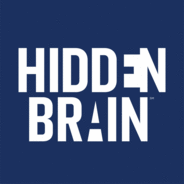It used to be that we tried our best to conceal disadvantages, hardships, and humiliations. But new research explores a curious shift: some people are flaunting limitations that don't exist. This week, we talk to psychologists Karl Aquino and Jillian Jordan about the strange phenomenon of wanting to seem worse off than we really are.Think back to the last time you tried to win an argument. What could you have done to bolster your case? Check out our recent episode "Less is More" for helpful strategies. And if you like our work, please consider supporting it! See how you can help at support.hiddenbrain.org.

Wissenschaft & Technik
Hidden Brain Folgen
Why do I feel stuck? How can I become more creative? What can I do to improve my relationships? If you’ve ever asked yourself these questions, you’re not alone. On Hidden Brain, we help you understand your own mind — and the minds of the people around you. (We're routinely rated the #1 science podcast in the United States.) Hosted by veteran science journalist Shankar Vedantam.
Folgen von Hidden Brain
569 Folgen
-
Folge vom 10.04.2023Crying Wolf
-
Folge vom 06.04.2023The Snowball EffectWhy do some companies become household names, while others flame out? How do certain memes go viral? And why do some social movements take off and spread, while others fizzle? Today on the show, we revisit a favorite 2021 conversation with sociologist Damon Centola, who studies social contagion and how it can be harnessed to build a better world.Think back to the last time you tried to win an argument. What could you have done to bolster your case? Our recent episode "Less is More" has helpful strategies — you can find it here or in your podcast feed. And if you like our work, please consider supporting it. Thanks!
-
Folge vom 03.04.2023Less is MoreAt every stage of life, there are moments when we need buy-in from other people. Yet most of us make a fundamental error when we try to persuade others to see things our way. This week, we talk with Niro Sivanathan of the London Business School about how to make a convincing argument. Then, we learn about what happens to our brains and bodies when we're the recipients of information. Bryan McLaughlin of Texas Tech University shares why it's so hard, but so important, to unplug from the news. Have you ever wondered where the concept of implicit bias comes from? Be sure to check out our recent series, "Revealing Your Unconscious." You can find part 1 here and part 2 here. And if you like Hidden Brain, please consider supporting the show. Thanks!
-
Folge vom 27.03.2023How To Make AmendsWhen James and Donovan first met, they knew little about each other, except that Donovan had stolen James' bike. Donovan got caught, and spent a month in jail. It was a story with a happy ending, as far as James was concerned. But then he found out, nearly a decade later, what happened to Donovan after his conviction. This week on the show, we look at the unexpected aftermath of a crime, and what happens when adversaries meet in conversation instead of a courtroom.Have you ever wondered whether you have beliefs that might be hidden from your conscious mind? Be sure to check out our recent series on implicit bias — you can find the first episode here. And if you like our work, please consider supporting it! See how you can help at support.hiddenbrain.org.
